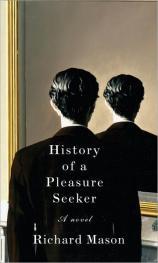 Richard Mason was a wunderkind whose first novel, Drowning People, published when he was 21, won prizes and was met with worldwide acclaim. The film of it is in production. Now 33, he is publishing his fourth novel, History of a Pleasure Seeker (Knopf), a literary romp through the erotic adventures of a handsome, talented, sexually ambiguous rake, Piet Bartol.
Richard Mason was a wunderkind whose first novel, Drowning People, published when he was 21, won prizes and was met with worldwide acclaim. The film of it is in production. Now 33, he is publishing his fourth novel, History of a Pleasure Seeker (Knopf), a literary romp through the erotic adventures of a handsome, talented, sexually ambiguous rake, Piet Bartol.
Our interview with Richard Mason quickly segued into a give-and-take conversation. He is erudite, friendly, forthcoming, witty and just plain fun to talk to--and that plummy accent makes listening a pleasure.

The Lulutho Project is funded through the Kay Mason Foundation, formed in memory of his sister, who committed suicide 23 years ago, and supported with proceeds from his books. Mason laments that "not enough was known about bipolar disorder when Kay was alive" and so he set up the foundation to help others in her name. Mason himself has had periodic bouts of depression, born of a tendency to perfectionism, along with a manic side, symptomatic of the bipolar disorder that runs in his family. He suffered a major breakdown eight years ago, due to stress and overwork, and might have seriously contemplated suicide then were it not for the support of his parents and Morse. He now manages the potential roller-coaster ride with the aid of medication, a stable life, and a diet and exercise program.
In talking about History of a Pleasure Seeker, the first thing that comes to mind is the importance of music in the narrative. Mason makes the reader see with words what we would ordinarily need to hear. Piet seduces and holds at bay various women by playing piano compositions appropriate to the mood and to what he wants to accomplish. In talking about his musical background, Mason said, "I have played the piano for many years. I still play a lot. It is a creative lifesaver for me in that different pieces of music will give me the shape of the story. In fact, the book will come with an app, so that when you read the novel you can hear the music simultaneously."
The setting of the book and the choice of the belle époque time frame are somewhat exotic and we wondered at those choices, so perfect for the story.
Mason explained, "So many European cities have been written about endlessly; Rome, Paris, Florence, Venice... Amsterdam has not, and it is such a beautiful city, so restrained and so little explored. Its architecture and look lend itself to the belle époque. Also, I think that the era has much in common with our own age. There is such freedom of buying and spending, but also with dark clouds on the horizon. Great splendor contrasted with looming financial crisis. When I was sketching the plot I knew that there would be a financial crisis in the story line. Should I invent one or...? I then discovered that there was a worldwide crisis in 1907, which suited the story very well." The patriarch of the household was invested in New York, in the construction of a major hotel patterned after a European palace. The economic crash resonates through his home and family.
With his varied background and peripatetic tendency, we wondered about Mason's reading habits. He recalled: "Oh, I remember such happy times as a child, curling up with a good book. Then I took an English degree at Oxford and there was so much reading that it was rather spoiled for a while. There were times when we read three Dickens novels in a week. Now, the joy of reading has come back to me. If an author breaks trust, I put down the book; when a book gets me, there is no keener pleasure. I read a lot of nonfiction. Reading somebody else's fiction can be distracting when I'm writing."
We ventured the opinion that Piet Barol is too good for just one outing. Are there any further plans for him? "Yes," Mason confirmed. "In the U.S. reader's edition the last line was left out. It says that there will be a new story--a continuation--opening in Johannesburg in 1913."
Something for readers to look forward to. --Valerie Ryan, Cannon Beach Book Company, Oregon

